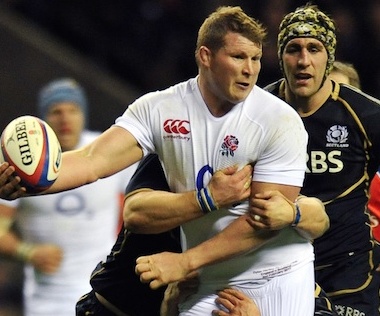
Dylan Hartley
When the World Cup kicks off in a little under a year’s time, England will have played all but one of the other nine sides in the top ten of the current IRB World Rankings. Psychologically, it is a huge 12 months for next year’s hosts.
In the past few seasons, they have made huge strides in the right direction – but they are not the finished product yet.
The Rugby Blog
With the world’s top three sides arriving at Twickenham this autumn, and a Six Nations tournament against the best of the rest early next year, the players know they have to start consistently winning the biggest games.
“The biggest thing is learning our lessons,” says hooker Dylan Hartley. “France away last year – losing in the last two minutes – the All Blacks games, coming within a score in the last few minutes of the game, but then not winning these big games, that’s what we need to eradicate.
“We need to be the ones on the right side of those results. We get to do that this November, and it’s going to be a no excuse environment. We’re not just gelling together anymore, we’re a performing team and we need to close out those big games.”
Two fixtures in the next year stand out in particular: Australia at Twickenham in November and Wales at the Millenium Stadium on the opening weekend of the Six Nations. Both are great rivals anyway, but with the three sides all wedged into one World Cup pool, from which only two can qualify, these games take on even greater significance.
Everyone is painfully aware of the fact that one of the genuine contenders to lift the Webb Ellis Trophy will be going home early.
“We just need to make sure it’s not us,” Hartley says bullishly. “We’ll just worry about ourselves. It’s a long way off – we get to play Australia and we get to play Wales before that World Cup, so we’ll know each other well enough by then.
“It’s not going to define our World Cup, whether we win or lose these big games, but it would be nice having that in the bag.”
Hosting a World Cup can obviously be a huge boost to a team, but it also creates an immense amount of pressure to perform. With such a tough pool, England’s task is an unenviable one and an early exit would be a catastrophe. It’s a situation the players will never find themselves in again.
“It’s a World Cup – it’s not going to come round often and on home soil, it’s not going to come around again in my lifetime. It’s a tough pool but then everyone will say they’ve got a tough pool.”
The ghosts of 2011 still linger. England’s ill-fated campaign was overwhelmingly negative, the team’s colourful off-field antics in stark contrast to the dull rugby they produced on the pitch. As one of a handful of survivors from that tournament, Hartley swots away suggestions that they have a point to prove because of it.
“I don’t think we can even bother looking back to that,” he insists. “The steps we’re taking as a team now have been huge, and it’s all forward thinking and it’s almost coming down to crunch time.
“This autumn and the Six Nations, it’s crunch time – performing, and winning, big games and then taking that into a World Cup.”
Winning the big games is a recurring theme, and for good reason – it’s something England have failed to do. The pace-setters in this regard, of course, are New Zealand, and so it’s no surprise that Hartley cites the country of his birth as an example of where England want to be.
“They’re World No.1 – they win games like that. You think about that game they had over in Dublin, when Ireland came so close. But that’s what they do, they win games in the last play of the game. And rightly so, that’s why they are where they are. The next step forward for this England team is to win those games, get on the right side of those results and not be left wondering.”
Left wondering is exactly what England will be if they don’t perform in a year’s time. Never mind the home soil part, the World Cup comes around so infrequently that for many of these players it will be their only shot at rugby’s ultimate prize.
Hartley sums it up best: “It’s not a case of ‘we’ll get them when they come tour here in six months’ time’ – it’s all or nothing.”